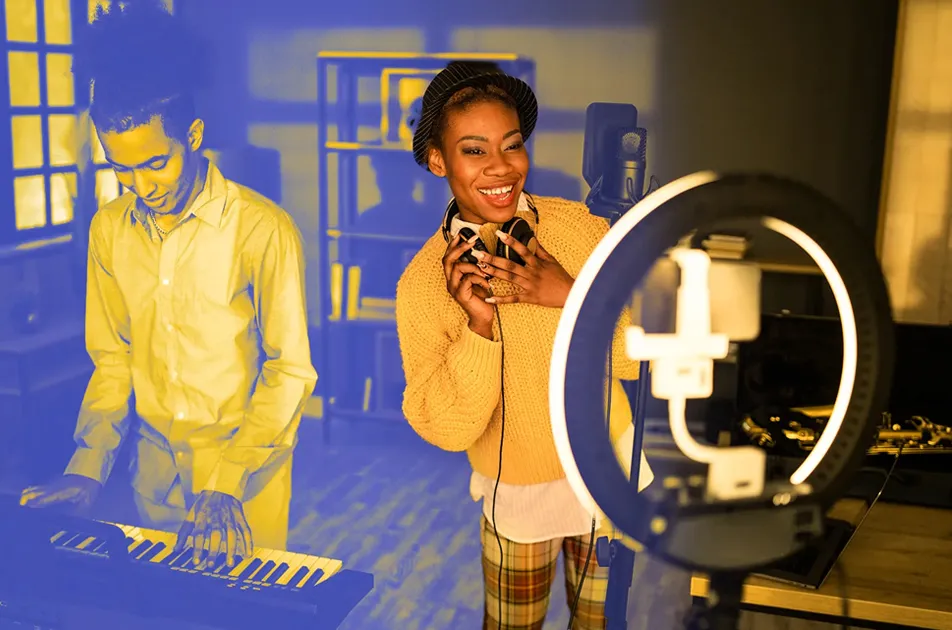Musicians and fans young and old can get something out of this incredible Spotify For Artists “Best Advice” with the legendary Nile Rodgers.
by Caryn Rose of Spotify For Artists
[Podcast below.]
If Nile Rodgers had done nothing else but write “Good Times,” (a song that has been sampled and interpolated into tracks by the Sugarhill Gang, Luther Vandross and Da Click to name a few), he’d be worthy of a lifetime of admiration and praise. But he’s also a six-time Grammy award winner, an inductee into both the Rock & Roll Hall of Fame and the Songwriters Hall of Fame. He co-founded Chic with Bernard Edwards, and has produced, worked with, or played on records with a list of galactic superstars: Madonna, David Bowie, Sister Sledge, Duran Duran, Mick Jagger, Grace Jones, Daft Punk, Lady Gaga, Diana Ross, and that’s just the tip of the iceberg.
But Rodgers was once upon a time a struggling musician picking up work wherever he could find it, taking lessons, and doing everything he could to improve his craft. On this new episode of our Best Advice podcast, Rodgers talks with host Kim Taylor Bennett about everything he’s learned on his journey to now. Read on for some highlights of their conversation, and then listen to the full episode to hear the rest:
What he learned from Madonna
Madonna used to make a joke — well, she wasn’t joking, but she put it to us in a joking way — she would say, “Time is money and the money is mine.” And that always, always, kept me on my toes. And I tried to be very, very economical when it came to record product. I had a party with Madonna a few weeks ago, and I told her that I reminded her [of] that she said, “No shit. I still say that.” I love her. I’ve never met anyone with a work ethic like that. I’ve heard that Beyonce is like that. And I’ve also worked with Lady Gaga who was insane, the work ethic was just off the charts. But Madonna, man. You know, she says, “I don’t quite work like that anymore.”
What he learned from his two greatest mentors
The two greatest mentors in my life would be Bernard Edwards, my former partner, and [American jazz guitarist] Ted Dunbar. Ted Dunbar is probably the most important because he gave me a mental and artistic shift.
I was studying theory and jazz guitar with Ted Dunbar and one day I came in for my lesson and I had a real sourpuss look on my face. He was wondering why, because I’m always such an up guy. And I thought I would score brownie points with him because I said to him, ‘Oh man, look at this bullshit gig I’m playing tonight.’ He says, ‘What are you talking about?’ You know, to him every gig was sacred. What do you mean that you’re playing music for a living and you call your gig bullshit. Where are you coming from?
I further explained to him that I was doing a top 40 gig. I said, “Well, look at the set list. I gotta start with this song called ‘Sugar, Sugar’ by the Archies. And he looked at me and he says, “Do you know that ‘Sugar Sugar’’s been number one for like three weeks or so? And I said, “Yeah.” He looked at me again and he said, “Am I hearing this right? Those millions of people who bought ‘Sugar, Sugar’ are wrong, but you, Nile Rodgers, you are right.” And all of a sudden I just started thinking logically. Logically, he was making a huge amount of sense to me as an artist, as a human being. How am I gonna go against what millions and millions of people are thinking, especially if I’m trying to communicate with them.
But I still wasn’t on that same page. And then he said something that blew me away. He says, “Nile, any song that’s in the Top 40 is a great composition.” In those days the Top 40 was very important because if you were in the top 40, you probably already sold a million records. I said, “You’re saying ‘Sugar, Sugar’ is a great composition. How could you say something so absurd?” And he says, “Because it speaks to the souls of a million strangers.” I almost started crying when he said that. He just described who I wanted to be as an artist, and I didn’t know that’s who I wanted to be. I wanted to speak to the souls of a million strangers. Two weeks later, I wrote “Everybody Dance.”
About “band logic” and David Bowie
It’s never ever to be confused with actual logic, but to us musicians, it makes so much sense at the time. It’s when a person says something ridiculous, but in our heads we go, “Huh, I get it.” When Bowie told me that he wanted his album Let’s Dance to sound like a picture that he showed me, I knew exactly what he was talking about. He didn’t have to say another word. Because it was band logic. I was able to take whatever happened at that exact moment and turn it into a concept in my head and I kept that concept near and dear to my heart.
It was a picture of Little Richard and he had his hair dyed red. He was wearing a red suit and he was getting it into a red Cadillac. And the thing that Bowie really meant was he wanted his album to be evergreen. If we listened to Let’s Dance today, he wanted it to sound like we made it that morning. Because if you looked at that photo that he showed me, even though I could tell that it was from the ’50s, the way that Little Richard was stylized and posed and because of the Cadillac with the fins and the weird tail lights. It also looked like it could be from the future.





